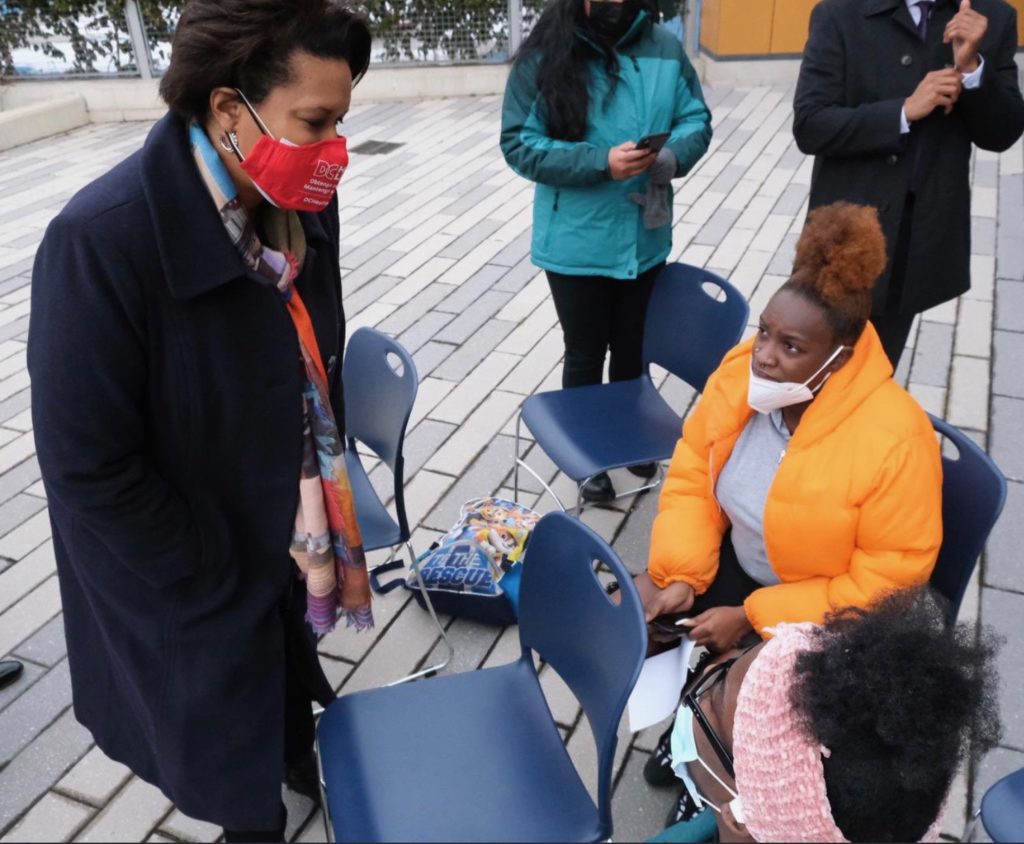City-Wide Vaccination Entry Requirements Begin Saturday, Jan. 15
By • January 13, 2022 0 1856

Mayor Muriel Bowser has ordered that starting this Saturday, Jan. 15 at 6 a.m. patrons of public businesses will be required to verify vaccination against Covid-19 prior to entry, as the rapid spread of the Omicron variant has exacerbated the District’s Covid-19 public health emergency and created staffing shortages in local hospitals.
With the new “VaxDC” requirements, all patrons 12 years-old or older will have to show proof they have received at least one dose of Covid-19 vaccine before entry is allowed. Starting Feb. 15, proof of at least two doses of vaccination will be required. While patrons 12 years-old or older may simply show proof of vaccination, patrons 18 years-old or older must also show photo identification.
According to coronavirus.dc.gov, acceptable forms of “proof of vaccination” include: a CDC issued vaccination card (original, photocopy, or digital copy/photo); a Record of Immunization from a healthcare provider or public health authority; a Covid-19 verification app (e.g., VaxYes, Clear, Excelsior, MyIR) or a World Health Organization Vaccination Record.
Upon entry to public businesses, patrons will still be required to comply with D.C.’s current indoor mask mandates, unless they are “actively eating or drinking.”
At customer entry points, establishments will be required to display signage from the VaxDC program reading, “Attention: Per Mayor’s Order 2021-148, COVID-19 Vaccination is REQUIRED to enter this business.” Business proprietors can download VaxDC signage from vaxdc.dc.gov. Signs must be displayed “at the entry point of the establishment, such as a door or window.”
VaxDC requirements will affect indoor food and drink, cultural and entertainment, exercise and recreational as well as event and meeting establishments. Though patrons might claim medical and religious exemptions, notes from medical providers or personal attestations of belief will be required.
Businesses or organizations exempt from VaxDC requirements include retail, grocery stores, farmers markets, charitable food establishments, houses of worship, hotels (except meeting rooms, ballrooms and hotel restaurants and bars), homeless shelters and other human services facilities, health care facilities and pharmacies, private meeting spaces in office buildings or residential buildings, and gyms and fitness facilities operating for sole use of residents.
To ensure compliance, District agencies such as DC Health, ABRA and DCRA will “deploy staff for spot checks” to make sure “businesses and organizations have appropriate processes in place to comply” with the Mayor’s VaxDC order. If businesses don’t demonstrate a “good faith effort to comply,” they could be subject to “appropriate enforcement actions, including civil fines of not more than $1000 and/or summary suspension or revocation of business license(s).”
What is the nature of the crisis at hand justifying the VaxDC regulations? On Jan. 11, Mayor Bowser declared a “limited public health emergency until January 26, 2022” due to severe strains in the District’s hospital and critical care capacities as a result of the rising number of Covid-19 cases in the city.
In the order, Bowser cited more than 61.5 million Americans “diagnosed with Covid-19” and more than 836,000 nationwide deaths from the disease. Locally, she wrote, “total infections in the District have risen to 116,278; and tragically, 1233 District residents have lost their lives due to Covid-19.”
Despite high vaccination rates in the District, the mayor wrote, “stress on the District’s hospitals and healthcare providers has recently increased. Not everyone can be vaccinated, and even infections that do not result in hospitalization result in sickness and labor shortages. The physical capacity of hospitals remains strong, but emergency rooms are overwhelmed with persons suffering from Covid-19 and persons who fear having Covid-19, causing long delays both for them and for other patients. Further, hospitals cannot use all of their bed capacity due to staff shortages. Some hospitals are experiencing 25% staff-out on Covid-related leave and some emergency rooms are overwhelmed with dozens of persons waiting for a room in the hospital itself.”
Jacqueline Bowens, associate president of the D.C. Hospital Association highlighted the hospital staffing crisis due to Covid-19 spread in the District. “The impact to health professionals and support personnel who are testing positive for Covid, due to this significant community spread” is a major factor, she wrote in a letter to WTOP. “This strain is felt throughout the healthcare continuum.”
The District’s deputy mayor for the Department of Health and Human Services, Wayne Turnage, concurred that the most recent spike in Covid-19 cases in the District has put severe strains on D.C.’s hospitals. “This is different from 2020. In 2020, hospitals had real capacity issues. They weren’t losing staff. But the influx of sick patients was so significant that we had to make plans to expand the footprint of the hospitals. And this time, the response was that they were losing staff,” Turnage told WTOP reporter Megan Cloherty.
In a Jan. 10 Coronavirus (Covid-19) Situational Update from the mayor’s office, two pandemic metrics have worsened in the District markedly: the weekly case rate per 100,000 persons has risen to 1,506.4 and the daily case rate per 100,000 persons has risen to 215.2. However, two other metrics have shown improvement over recent weeks: the percentage of fully-vaccinated D.C. residents as of the briefing was 66.3 percent and the percentage of Covid-19 cases in the District leading to hospitalization was 5.2 percent.

